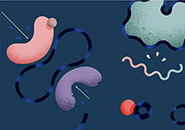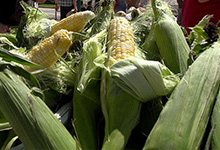
Scientific Discipline
Computational Biology, Plant Biology
Related Links
Host Institution
Catholic University of Chile (Santiago)
Current Position
Dr. Gutiérrez is an associate professor in the Department of Molecular Genetics and Microbiology at the Catholic University of Chile in Santiago, Chile.
Current Research
Spatiotemporal Nitrogen Regulatory Networks in Arabidopsis thaliana
Research
Biography
Chilean biologist Rodrigo Gutiérrez thinks plants take a lot of undeserved abuse. The resilience with which they handle it ought to earn them more respect among scientists, he argues.
“We stomp on them, pull leaves off, and they manage to survive—without the ability to think or move away,” he says. “They’ve been here well before us and they’ll probably be there after us. But we know so very little about them.”
Part of Gutiérrez’s lifelong obsession with plants is driven by an admiration for their ability to adapt to conditions where they live. To survive, plants must be prepared to manufacture the molecules they need in a given situation. Gutiérrez is particularly interested in the metabolic pathways they use to produce the right molecules at the right times.
When he entered college, eager to begin investigating the questions that intrigued him, he naively thought he would go to the library’s reading room and read through all the current scientific journals. When he saw several hundred titles, he was shocked by the staggering amount of information available—and dismayed that he could never read it all.
“I knew there had to be another way to look at problems beyond a reductionist approach of separating things into their parts and analyzing them in detail,” Gutiérrez says.
Today, in his lab at the Pontifical Catholic University of Chile (Pontificia Universidad Católica de Chile), he abandoned that piecemeal approach in favor of the big picture. He’s studying how plants detect and respond to nitrogen from the perspective of the whole organism—one of the first to take the “systems biology” approach to plant research.
Nitrogen availability is what most often limits plants’ growth, both naturally and agriculturally. To boost growth, farmers add fertilizers to the soil, but because plants cannot reach, absorb, or use all of the added nitrogen, as much as 40 to 70 percent can be lost to the environment. The leftover nitrogen contributes to greenhouse gases, acid rain, coastal dead zones, and global warming. Improving the efficiency with which plants use nitrogen could lessen the demand for fertilizers, reducing both agricultural expense and environmental toxicity.
To do that, Gutiérrez says, scientists need a better understanding of how nitrogen-sensing pathways interact with pathways through which plant hormones trigger growth and development. He wants to draw a detailed molecular picture of how a plant responds to nitrogen and how that response varies in different cells and as the plant progresses through different life stages. “In concept, this sounds very simple,” Gutiérrez says. “But in practice it is a very complicated thing.”
A single experiment examining a plant’s genetic response to a few different conditions can yield thousands of data points, Gutiérrez points out; related experiments might generate equally long lists of proteins or RNA molecules. All of these different kinds of information must be integrated to make the data truly meaningful, he argues. It’s a daunting task, particularly with existing computational tools. So alongside the experimental work in his lab, Gutiérrez has recruited a team of computer programmers and bioinformatics specialists to develop better bioinformatics tools. “For the type of work we do, it is really important to be able to do both [biology and computer science],” he says. “The mathematical models we make are good guesses, but they need to be tested in the lab because so little is known about plant metabolism.”
With this approach, Gutiérrez is turning up connections between processes that traditionally have been studied by different camps of biologists. In collaboration with his postdoctoral advisor, U.S. scientist Gloria Coruzzi, he found a regulatory mechanism that links nitrogen sensing to the plant’s circadian clock, so that nitrogen is procured only when light can supply the energy needed to build proteins. His team in Chile has also found a feedback loop between nitrogen availability and the plant hormone auxin, which controls root architecture. They showed that excess nitrate in soil turns up the volume on auxin signaling, causing the plant to slow downward root growth and switch to expanding its lateral roots. In other words, the plant stops exploring and roots increase their surface area for better nitrogen intake.
Gutiérrez’s fascination with plant metabolism extends outside the lab to his own garden, where he cultivates herbs and peppers. The searing capsaicin produced by his Bolivian locoto, or “crazy hot,” peppers offers a dramatic example of the specialized compounds that plants can produce—exactly what attracted him to plant biology in the first place.
Articles & News
Research Papers
Selected Research Papers



